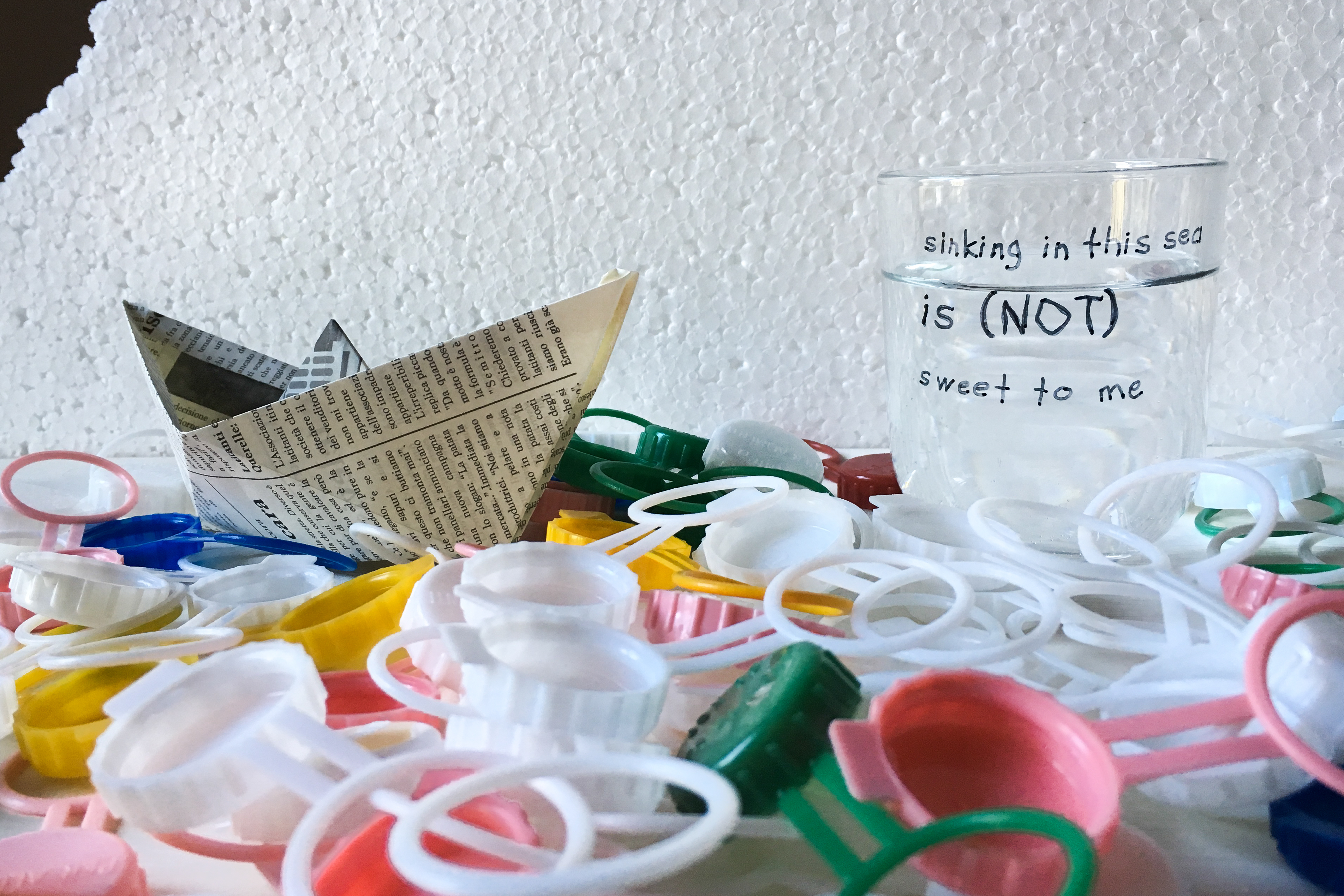We are water. There is no life without this simple particle. Salty or pure, water is life and, as humans, we have to protect its purity from one of the biggest danger: the plastic waste.
Today, water is at big risk because of pollution and of the numerous unacceptable behaviours of people. But thanks to Art we can do something to save it.
We must be informed, and we must inform. We must be educated, respecting nature, and we must educate the next generations to respect nature. We must be proactive every day using good practices for the change.
To this end, the Italian artist Pablo Dilet created an art installation that can answer to these fundamental needs and that can create a suggestion about our role in the safeguard of water.

Plastic Waste, an artwork inspired by a Poem
For the Universal Sea call, the artist reflected on one of the most famous Italian poem in the world, “The Infinito” of Leopardi. Giacomo Leopardi wrote at the end of the poem “… and sinking in this sea is sweet to me”. The Infinito (infinity) takes us to imagine and dream about beauty. But sinking in a contaminated water is NOT sweet. Therefore, Pablo Dilet decided to create his artwork modifying Leopardi’s poem: “Sinking in this sea is (not) sweet to me”.
In the artwork, Dilet focuses on the pure water and on its opposite, the plastic waste. The artwork represents a boat that wrecks in a plastic sea. At the horizon, there is a glass of pure water. The boat is created using newspaper (be informed), the plastic makes the navigation impossible (be educated), but the horizon is the hope (be proactive). “Sinking in this sea is (not) sweet to me” has an important dual role as an artwork addressed to adults, which will reflect on their everyday behaviours and on their consequences, and also an art-education project that has the potential to educate the new generations. Children will build a boat using a newspaper, then they will put plastic in a glass container, but the boat will only sail when the plastic will be removed, and the water will be clean again. At last, water and the LIFE will be saved.
The sea is made of water and even though it has different names such as the Atlantic or the Pacific Ocean, the Mediterranean or the Black Sea, the water is a universal idea and it is interconnected. And each of us can be part of its safeguard. No differences, no colours but one idea: pure water for Mother Earth.
The past summer, Dilet built an analogous nature focused artwork, called PLASTIC, in which a turtle saved after eating plastic waste was the protagonist. The art installation was exposed in the biggest European marine protected area.
Three actions with the public of Universal Sea
Dilet, involving the public, focuses on three actions to complete his project and they rise from the consideration that children are the future and that they can also change our behaviours.
The objective is to create in children a disruption effect about the plastic waste problem and, at the same time, to make them fascinated by the possibility to help nature with our actions.
Children’s involvement will be the power of adult’s involvement.
The first step (be informed) is a public discussion to share and bring up information about plastic waste and the issues that are causing. To this end, schoolchildren (in a public space) will create a carpet using printed articles about plastic waste.
The second step (be educated) is an educational art project in which the audience (children mainly) will directly experience the effect of pollution. Participants will create paper boats, like origami, and then they will put it on a dish full of plastic and water. The action is to pull out the plastic to make the navigation possible.
The third and final step (be proactive) is to bring together the ideas and the knowledge necessary to define good actions for solving the problems affecting our waters. The ideas and the good practices will be drawn in special copybooks to be read again like a good storybook.
Pablo Dilet and his social art project
Dario La Rosa, born in Palermo, Italy in 1980, is a journalist and artist. As an artist, he prefers to refer to himself as Pablo Dilet, a pseudonym he uses for his art and communication project. As a journalist, he transforms the main journalistic instruments (words) in artworks with a big communication impact and social values.
His artistic life started in 2016, when he built the word “Thank You” using red plastic bricks, to create a feeling to build every day. Later, Pablo Dilet focused his work on the problem of migrants, realizing the word “Welcome” in barbed wire, to point out the ability to be hospitable, afterword the “Welcome Carpet” using migrant carpets to tell their stories in the Unesco area of Palermo.
With his body of work, Dilet also explored some traditional concepts such as the importance of “Pane” (Bread), the necessity to think positive “Futtitinni” and the theme of “Libertà” (Freedom) using a bike as a symbol of society’s possibility to be free and to gain freedom using our power. In addition, the artist created other nature related projects such as the art installation called “I am only a tree”, using hanky papers to create a reflection about the role of nature. Living on the island of Sicily, the Italian artist has a particular relation to the sea and always pays much attention on plastic waste.
To find out more about Pablo Dilet’s artworks, have a look at his Instagram or Facebook or personal website.
